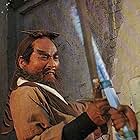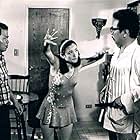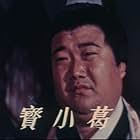- Director
- Writer
- Stars
- Awards
- 1 win & 2 nominations
Photos
- Director
- Writer
- All cast & crew
- Production, box office & more at IMDbPro
Storyline
Featured review
Fei Tian, or Accidental Legend quite surprised me. I had already seen another film by the same director, Grandma and Her Ghosts, which was an animated feature from Taiwan, and expected another Taiwanese film. This movie is, however, set in the very dry, dusty hills of NW China, which are the visual highlight of this film.
This is not to say that the story itself was not worthwhile. It was, in fact, an unusual mix of adventure, humour and social commentary, in which several strands of narrative are woven into a well-balanced hole that, while following some genre conventions, was not as predictable as it might have been.
The main threads of the plot have to do with children from a 'thief village', which consists of outcasts left behind after an assortment of insurrections and revolts (White Lotus cult, Heavenly Kingdom). The children of the village have well-honed thieving skills that are, in the story, employed by a Fagin-type character who leads a group of crippled beggars. The village is facing starvation, and its inhabitants are reduced to eating leaves, while the village elders try techniques and prayers for rain from the various cults they have sprung from, be they Buddhist or Christian. Miao Sanshun, a legendary Robin-hood like figure, seems to be their last hope, but he has not been heard from for ten years. Will he return, if he is still alive? Has he already returned? Another thread of the story involves the imperial exams, faked exam papers, corrupt officials, and the golden eyes of an official seal which have gone missing.
The characters are all well-painted, and the film takes its time drawing together the plot lines towards an inspired climax. It touches on a number of issues, such as social exclusion, corruption, the burden of identity, and the question of separating lies from truth, real from fake. At heart, however, the film is entertainment, not philosophy, and these questions spring naturally and unobtrusively from the narrative.
At over two hours, it does seem a little slow-paced at times, but the acting is fine, there is much good humour, and the natural setting is put to excellent use. If anything, the huge dry hills dwarf the human drama playing out on them, diminishing its importance 'in the grand scheme of things'. But these are 'the little people', the oppressed and marginalised, so perhaps this inhospitable landscape serves as a symbol too. In the end, it is no more inhospitable than 'decent' society itself, which wants to be protected from these outcasts, even while it constantly harasses and exploits them.
This is not to say that the story itself was not worthwhile. It was, in fact, an unusual mix of adventure, humour and social commentary, in which several strands of narrative are woven into a well-balanced hole that, while following some genre conventions, was not as predictable as it might have been.
The main threads of the plot have to do with children from a 'thief village', which consists of outcasts left behind after an assortment of insurrections and revolts (White Lotus cult, Heavenly Kingdom). The children of the village have well-honed thieving skills that are, in the story, employed by a Fagin-type character who leads a group of crippled beggars. The village is facing starvation, and its inhabitants are reduced to eating leaves, while the village elders try techniques and prayers for rain from the various cults they have sprung from, be they Buddhist or Christian. Miao Sanshun, a legendary Robin-hood like figure, seems to be their last hope, but he has not been heard from for ten years. Will he return, if he is still alive? Has he already returned? Another thread of the story involves the imperial exams, faked exam papers, corrupt officials, and the golden eyes of an official seal which have gone missing.
The characters are all well-painted, and the film takes its time drawing together the plot lines towards an inspired climax. It touches on a number of issues, such as social exclusion, corruption, the burden of identity, and the question of separating lies from truth, real from fake. At heart, however, the film is entertainment, not philosophy, and these questions spring naturally and unobtrusively from the narrative.
At over two hours, it does seem a little slow-paced at times, but the acting is fine, there is much good humour, and the natural setting is put to excellent use. If anything, the huge dry hills dwarf the human drama playing out on them, diminishing its importance 'in the grand scheme of things'. But these are 'the little people', the oppressed and marginalised, so perhaps this inhospitable landscape serves as a symbol too. In the end, it is no more inhospitable than 'decent' society itself, which wants to be protected from these outcasts, even while it constantly harasses and exploits them.
Details
Contribute to this page
Suggest an edit or add missing content





